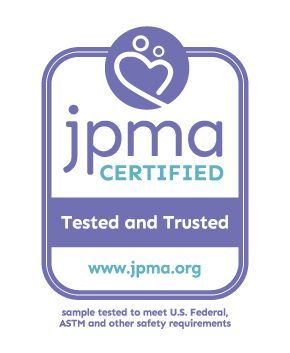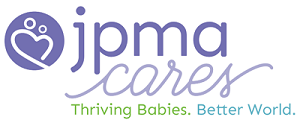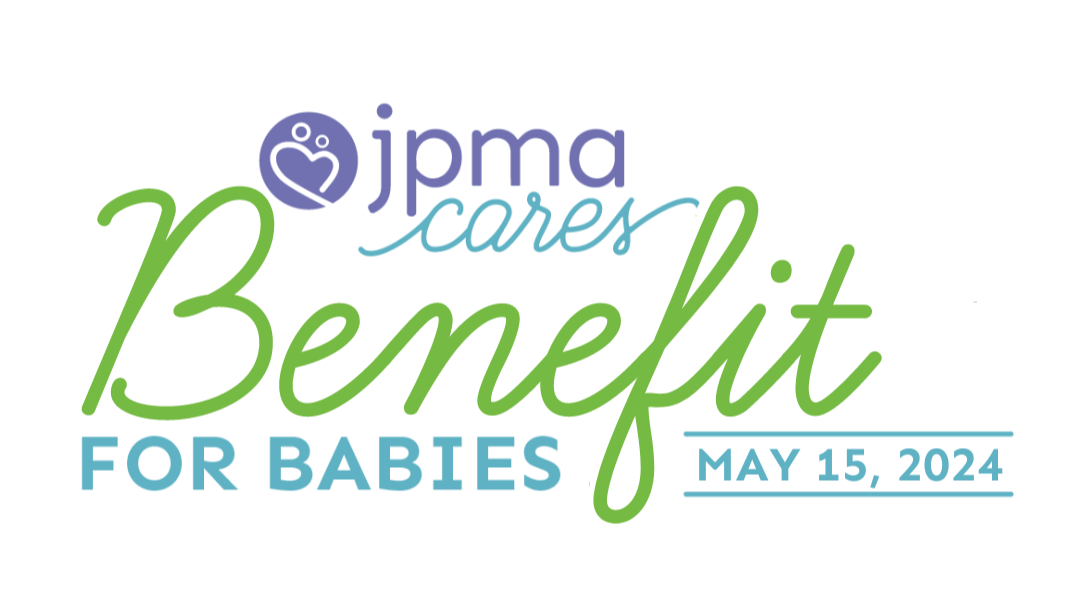Certificado JPMA Probado y confiable para su familia
Como voz de la industria en materia de calidad y seguridad de productos para bebés y niños, JPMA le ayuda a elegir y utilizar los mejores productos para bebés para su familia. El galardonado Programa de Certificación de JPMA prueba más de 2500 productos en 29 categorías diferentes para garantizar que cumplan con los más altos estándares de seguridad de desempeño. El Sello de Certificación JPMA en su producto o empaque significa que ha sido probado según todas las regulaciones federales y estatales, las voluntarias Estándar ASTM y otros requisitos de minoristas importantes en un laboratorio independiente acreditado por la CPSC. Los productos con certificación JPMA se prueban anualmente según los estándares más recientes para lograr una mayor seguridad. Las categorías de productos que pueden obtener la certificación JPMA incluyen:
Monitores para bebés
Moisés/cunas
Asientos de baño
Bañeras
Bañistas
Camas de noche
Cerraduras y pestillos de seguridad para gabinetes
Cochecitos/cochecitos
Cambiadores
Sillas plegables para niños
Colchones de cuna
Puertas y recintos ampliables
Asientos elevados para alimentación
Portabebés con estructura
Cunas de tamaño completo
Portabebés de mano
Sillas altas
Asientos para bebés
Asientos de piso para bebés
Mecedores para bebés y niños pequeños
columpios infantiles
Andadores para bebés
Patios de juego
Rieles de cama portátiles
Sillas portátiles con gancho
Portabebés
Portabebés blandos
Centros de actividades estacionarios
Camas para niños pequeños
Si una empresa participa en una categoría determinada, todos los modelos de esa categoría se prueban y obtienen la certificación JPMA. En otras palabras, si una empresa figura como certificada en la categoría de carritos y cochecitos, entonces todos los cochecitos de esa empresa, independientemente del estilo, color, etc., están certificados por JPMA. Vea la lista completa de participantes del Programa de Certificación y sus categorías en el Directorio de productos certificados de JPMA por categoría o por fabricante. Los productos certificados por JPMA son probados y confiables, y brindan a los padres tranquilidad al comprar los productos más seguros para sus hijos. ¡Busque el Sello de Certificación JPMA cuando compre para bebé!

¿Tiene una cuna certificada por JPMA y necesita piezas de repuesto? ¡Compruebe la etiqueta de seguimiento! Si bien JPMA certifica la seguridad de los productos, no fabrican cunas ni tienen accesorios de reemplazo. La etiqueta de seguimiento de una cuna suele estar en el interior de una de las patas de la cuna. Contendrá la siguiente información: El fabricante o nombre de la marca Ubicación de producción País de origen Fecha de fabricación Número de lote Una vez que tenga esta información, puede visitar el sitio web del fabricante para solicitar piezas de repuesto, revisar el manual de instrucciones y las advertencias, y más. Si tiene alguna pregunta sobre el Programa de certificación JPMA o necesita más información, comuníquese con Jailynn McGhee, asociada de certificación y estándares de JPMA en jmcghee@jpma.org o (703) 299-8212.
Preguntas frecuentes sobre la certificación JPMA
What is JPMA Certification? What does a JPMA Certification Seal mean?
Baby and children’s products must meet minimum federal requirements based on safety and use. The JPMA Certification Seal signifies a product meets these and additional requirements. To become certified, each product is sample-tested at an independent laboratory to verify it meets the highest standards for safety, performance and functionality.
JPMA Certification is voluntary, and it is based on adherence to ASTM standards, federal and state laws and some retail requirements. The program is designed to provide peace of mind to parents that these products have been independently tested to the most stringent standards.
What chemical testing is included in the JPMA Certification Program?
The JPMA Certification Program tests to all federal and state chemical safety requirements for juvenile products. Our protocols require compliance with all 50 states, regardless of where the product is sold. These requirements restrict chemicals such as lead, cadmium, mercury, antimony, flame retardants, phthalates and more.
What is ASTM? Are ASTM’s standards required?
ASTM International, formerly known as the American Society for Testing and Materials (ASTM), is a globally recognized leader in the development and delivery of international voluntary consensus standards. Today, thousands of ASTM standards are used around the world to improve product quality, enhance safety, facilitate market access and trade, and build consumer confidence. The JPMA Certification Program is built on ASTM standards. ASTM standards do not widely address chemical safety but are focused on performance and general requirements. ASTM standards are voluntary, but the JPMA Certification Program and many federal rules for juvenile products rely on the ASTM standard as the basis for their own requirements.
What is the CPSC? What does it mean to test to CPSIA?
The Consumer Product Safety Commission (CPSC) is the federal agency tasked with regulating consumer products. Despite its huge responsibility, the CPSC does not (and cannot) certify or test each individual product on the market. The CPSC has rulemaking and enforcement tools to help regulate consumer products. Signed into law in 2008, the Consumer Product Safety Improvement Act (CPSIA) gave the CPSC a significant role in creating and enforcing federal requirements as they pertain to children’s products. Testing to CPSIA means that a manufacturer meets or exceeds the federal requirement for their product. All JPMA Certified products must test to the applicable federal regulation.
What is the difference between JPMA Certification and GreenGuard Certification?
There are various differences between the two programs. Primarily, JPMA does not create its own requirements, but rather relies on federal, state, ASTM and major retailer requirements to make up its testing protocol. The JPMA Certification Program is a third-party verifier that a company has met or exceeded all of these safety requirements. GreenGuard Certification is more focused on chemical safety and is in addition to existing regulations. Many JPMA Certification Program participants are also GreenGuard Certified.
What is the difference between JPMA Certification and UL Verification?
Underwriters’ Laboratories, or UL as it is universally known, tests and evaluates a variety of products and components. UL’s label on electronics and small appliances is the most recognizable. It means that the product has been found to be free from a reasonably foreseeable risk of fire or electric shock in most environments. The JPMA Certification Program verifies compliance with the UL program for any products that have an electrical component.
What is Prop 65? Why is there a Prop 65 warning on my baby product?
Proposition 65 requires businesses to provide warnings to Californians about possible exposures to chemicals that cause cancer, birth defects or other reproductive harm. California’s Office of Environmental Health Hazard Assessment (OEHHA) maintains the list of Prop 65 chemicals that it considers harmful, and it updates the list at least once a year. At the latest count, the Prop 65 list contained more than 900 chemicals. These warnings are on a wide range of products and have to be posted in California businesses as well, if applicable. Despite being specific to California, all JPMA Certified products are required to have the Prop 65 warning. For many products, this warning is included if there is the slightest possibility of contamination during the manufacturing process.
What are PFAS? Are juvenile products regulated for PFAS?
PFAS are widely used, long-lasting chemicals, the components of which break down very slowly over time. There are thousands of PFAS chemicals, and they are found in many different consumer, commercial and industrial products—primarily outerwear, cooking pots and pans, and other waterproof or stain-resistant materials. This makes it challenging to study and assess the potential human health and environmental risks. Baby products are regulated for PFAS chemicals, primarily through state laws such as those in California and Colorado. Many baby product manufacturers do not add PFAS to their products, and other JPMA Certification Program is an added level of security to ensure they are compliant with the most current PFAS regulations. PFAS are widely used, long-lasting chemicals, the components of which break down very slowly over time. There are thousands of PFAS chemicals, and they are found in many different consumer, commercial and industrial products—primarily outerwear, cooking pots and pans, and other waterproof or stain-resistant materials. This makes it challenging to study and assess the potential human health and environmental risks. Baby products are regulated for PFAS chemicals, primarily through state laws such as those in California and Colorado. Many baby product manufacturers do not add PFAS to their products, and our Certification Program is an added level of security to ensure they are compliant with the most current PFAS regulations.
What are phthalates? Are JPMA Certified products tested for phthalates?
Phthalates (pronounced THAL-eights) are a class of chemicals that are used to make plastics flexible [primarily polyvinyl chloride (PVC or vinyl)]. The chemicals also serve various functions in cosmetics, personal care and cleaning products. JPMA Certified products are tested for phthalates, as required by state and federal regulations.
What are flame retardants? Are JPMA Certified products tested for flame retardants?
Flame retardants are chemicals that are applied to materials to prevent the start or slow the growth of fire. They have been used in many consumer and industrial products since the 1970s to decrease the ability of materials to ignite. JPMA Certified products are tested for flame retardants in accordance with various state regulations.
What are VOCs? Does the JPMA Certification Program test for VOCs?
Volatile organic compounds (VOCs) are compounds that have a high vapor pressure and low water solubility. Many VOCs are human-made chemicals that are used and produced in the manufacture of paints, pharmaceuticals and refrigerants. An example is formaldehyde, which is regulated at both the federal and state level. JPMA Certified products are tested for formaldehyde, which is required by the EPA and various states.
Are JPMA Certified products tested for lead, cadmium or mercury?
Yes, JPMA Certified products are tested for lead, cadmium and mercury, which is required by federal and state regulations.
Are car seats tested for chemicals?
The JPMA Certification Program does not currently include a car seat category, as there is no ASTM standard for car seats. Car seats are regulated by the National Highway Traffic Safety Administration (NHTSA). Federal Motor Vehicle Safety Standard (FMVSS) 213, through incorporation of FMVSS 302, requires that car seats have flame retardant properties, and this is often solved by using chemicals. Many car seat manufacturers work to find chemical-free ways to protect families from the risk of fire in vehicles, while still complying with NHTSA’s flame retardancy requirements, and they make certain models or fashions without these chemical treatments. Learn more about car seat safety here.

















